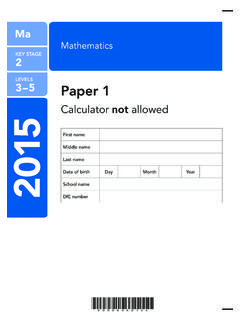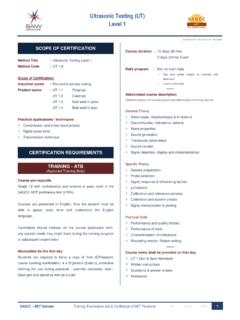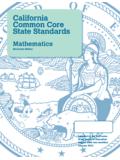Transcription of POLK STATE COLLEGE MAC 2233 APPLIED …
1 POLK STATE COLLEGE . MAC 2233 APPLIED CALCULUS. LAKELAND DEAN'S OFFICE: LLC 2255 PHONE: (863) 297-1024. WINTER HAVEN DEAN'S OFFICE: WSC 101 PHONE: (863) 297-1020. CREDIT HOURS, PREREQUISITES, AND COURSE DESCRIPTION: 3 hours Lecture, 3 credits Prerequisite: MAC 1105 or appropriate placement examination score This course provides the calculus needed by students in business, technologies, social sciences, and other areas that do not require a complete, detailed study of calculus. It is not intended as the first course in a complete series or as a substitute for a complete course in calculus. Topics include: a study of limits and rate of change, as well as differentiation and integration of algebraic, logarithmic, and exponential functions with particular emphasis on applications. This course is not designed to satisfy the calculus requirement for students majoring in mathematics, science, or engineering.
2 A graphing calculator (TI-83 or equivalent) is required. PSC MISSION AND CORE OBJECTIVES: Polk STATE COLLEGE is a quality-driven educational institution, providing access to affordable associate and baccalaureate degrees, career certificates, and workforce development programs, delivered by diverse, qualified faculty and staff who are committed to student learning and achievement through the consistent practice of collaboration and focus on excellence. In line with this purpose, PSC's general education develops competence in the areas of 1) Communication, 2) Critical Thinking, 3) Scientific and Quantitative Reasoning, 4) Information Literacy, 5) Diversity, 6) Culture, 7) Ethics and 8). Social Responsibility. Please see the PSC catalog for complete descriptions of these outcomes. A primary focus of this course is competence related to the areas of: 2.
3 Critical Thinking Demonstrate the ability to reflect on, analyze, synthesize, and apply information through problem solving. 3. Scientific and Quantitative Reasoning Understand and apply mathematical and scientific principles and methods to solve abstract and real-world problems. COURSE OBJECTIVES: 1. Apply differentiation techniques including the power, sum and difference, product, quotient, and chain rules. (3). 2. Apply basic antiderivative formulas and the integration technique of substitution. (3). 3. Use graphs as mathematical models to make predictions. (2, 3). 4. Determine limits of functions, if they exist, using numerical or graphical methods. (3). 5. Determine the continuity of a function from its graph. (2). 6. Sketch graphs of functions by using first and second derivatives to find maximum and minimum values.
4 (2, 3). 7. Compute the area under a curve over a given closed interval. (2, 3). 8. Compute instantaneous rates of change. (3). 9. Develop maximum and minimum problems as related to business and economics. (2, 3). 10. Solve application problems using exponential growth, exponential decay, and elasticity of demand. (2, 3). TEXTBOOK AND OTHER REQUIREMENTS: For textbook information, visit the campus bookstore, the bookstore website at , or see the course syllabus. COURSE CONTENT: Chapter R Functions, Graphs, and Models Chapter 1 Differentiation Chapter 2 Applications of Differentiation Chapter 3 Exponential and Logarithmic Functions Chapter 4 Integration (sections 1 5). Additional topics as determined by the instructor METHODS OF INSTRUCTION: These will vary according to specific course objectives, student learning needs, and instructional style.
5 THE GORDON RULE: The Gordon Rule, STATE Rule , requires program students to complete six semester hours of English and six semester hours of additional courses in which the student must demonstrate COLLEGE -level writing skills through multiple assignments Because PSC uses a "Writing Across the Curriculum". approach to meeting the writing requirement, in addition to the required composition courses, any of the required social sciences and humanities courses will fulfill the writing requirement. This is not a Gordon rule writing course, but it may include writing assignments as part of course requirements. In addition, STATE Rule requires program students complete six credits of COLLEGE level mathematics. Taking the appropriate general education mathematics courses satisfies the mathematics portion of the requirement.
6 A minimum grade of C is required in all courses with primary responsibility for fulfilling the communications and mathematics areas of the general education requirements. This includes any course taken to complete the general education mathematics requirement, and the courses taken to complete the communications requirement. STUDENT HELP: The instructor is available for help during posted hours and by appointment during other non-class hours. Students are encouraged to seek assistance from the instructor. To further the educational process, the Teaching /Learning /Computing /Center (TLCC) provides qualified staff and up-to-date equipment and facilities to promote student academic success by providing tutoring services, computing resources, and other instructional support. TLCC hours of operation and tutor schedules are posted in the TLCCs and available on PSC's website at: WITHDRAWAL: Students may officially withdraw from course(s) during any given term provided the appropriate policy and procedure is followed.
7 Following the conclusion of the Drop/Add period, the student may officially withdraw without penalty from any credit course provided the appropriate forms are submitted to Student Services no later than the deadline published in the term schedule booklet. (The published deadline reflects the 70% point in the course based upon the course's scheduled duration.) It is the student's responsibility to submit these withdrawal forms. Failure to do so may result in an F in the course. By STATE rule students are not allowed to withdraw from the third course attempt. If students stop attending class after the deadline, or any time during the third attempt, a grade other than a W is assigned and posted. Students cannot use course withdrawal to avoid academic dishonesty penalties. Students who have been penalized for academic dishonesty in a course are not eligible to withdraw from the course.
8 REPEATING A COURSE: Under the Forgiveness Policy, a student is allowed three attempts in any one COLLEGE credit course: one initial enrollment and two repeats. A course cannot be repeated unless the previously earned grade is a D , F , or W (see COLLEGE catalog for details). Students are not allowed to withdraw from their third course attempt. If students stop attending class, a grade other than a W is assigned and posted. ACADEMIC INTEGRITY: Students are responsible for their own work. It is assumed that each student is honest and will abide by that standard. However, in the event there is an indication or suspicion that there has been a case of cheating/plagiarism, the situation will be dealt with in accordance with published COLLEGE policy. Copies of this policy are available in Student Services offices.
9 INFORMATION TECHNOLOGY ACCESS/USE POLICY: All individuals who employ information technology resources provided by Polk STATE COLLEGE (this includes, but is not limited to telephones, computers, the PSC. local area and wide area networks, and the Internet) must use these resources for academic purposes only. Use of these resources is a privilege, not a right. Inappropriate use can result in revocation or suspension of this privilege. EQUAL OPPORTUNITY FOR STUDENTS WITH DISABILITIES: If you are a student with a disability and will need special accommodations or auxiliary aids under the Americans with Disabilities Act (ADA), please contact the Coordinator of Academic Advising in Student Services on the Lakeland Campus (863) 297-1000 Ext. 6110. or the Winter Haven Campus (863) 297-1000 Ext. 5227. EVALUATIVE CRITERIA: The grade for the course will be based on grades earned on progress tests, a comprehensive final examination and additional work as determined by the instructor.
10 The additional work, optional with the instructor, may consist of a combination of homework, quizzes, computer assignments, projects, in-class work or similar activities. The additional work, when chosen, will be combined into one grade and count as one progress test. Each progress test will count 100 points. The procedure for making up missed tests will be determined by the instructor. The course average at any time prior to the final examination can be determined by finding the average of the progress tests at that time. The final examination will count as 25% of the final course average with the final course average calculated by the formula: 3 (progress test average) + final exam percentage grade 4. The course grade will be determined by using the following scale: A = 90-100% B = 80-89% C = 70-79% D = 60-69% F = 0-59%.







